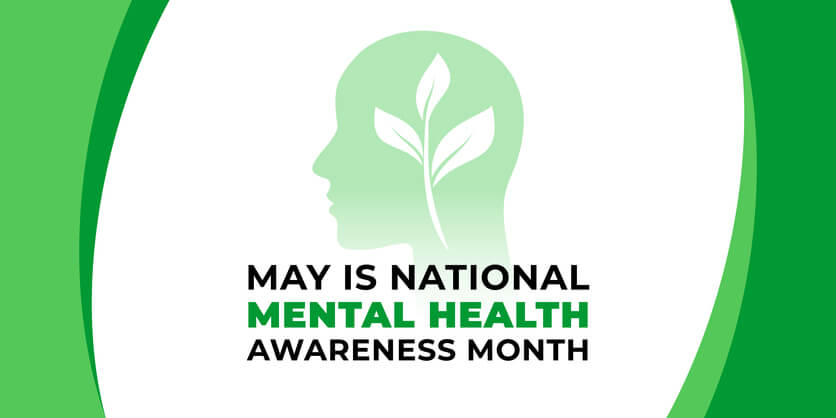May is Mental Health Awareness Month making it a good time to discuss the impact of oral health on your mental health, and vice versa.
Depression and anxiety impact many Americans, and mental health issues have soared due to the pandemic. 32.8% of U.S. adults experienced elevated depressive symptoms in 2021, compared to 27.8% of adults in the early months of the pandemic in 2020 and 8.5% before the pandemic.
If you or someone you know is thinking about harming themselves, you can call the National Suicide Prevention Lifeline at 1-800-273-TALK or Text HELLO to 741741 for the Crisis Chat Line. You can also call 911.
Stress, Anxiety, Depression, and Dental Health
Sometimes, it can be challenging to maintain dental hygiene when dealing with depression, anxiety, or other mental health conditions. Look for little wins that feel doable – like brushing your teeth – if that’s all that can be managed some days. Switching your toothbrush to something smaller and more fun, moving your toothbrush and your toothpaste into the shower, tracking habits/making lists, and rewarding yourself for each success can help.
It can also be a good idea to talk to a dentist or other healthcare professional about ways to manage dental problems caused by anxiety, such as grinding your teeth. Bruxism – the formal term for teeth grinding and clenching – can, in the worst cases, weaken teeth, fracture fillings, crack crowns and destroy dentures. The most common preventive treatment for severe cases of teeth grinding is to wear what’s called “a night bite plate” or a “bite splint.” Your dentist can help you get the right fit and show you how to wear it. It will reduce wear and tear on your teeth, may help you sleep better – and wake up without a sore jaw, aching teeth, or tender tongue.
Some medications can make your mouth dry. That can be uncomfortable, and it’s also not good for your teeth. Saliva helps control cavity-causing bacteria, and a dry mouth can increase the risk of gum disease. Dry mouth can also cause Burning Mouth Syndrome (BMS) . People with BMS can experience a scalding sensation on their gums, tongue, lips, roof of the mouth, inside cheeks, and the back of their mouth and throat. They also may have a bitter or metallic taste at the back of their throat, along with headaches or migraines.
People have reported relief from dry mouth by staying well-hydrated, using artificial saliva or other dry mouth treatments, and chewing sugar free gum. You can ask your dentist for suggestions and for help with treating dry mouth.
Anxiety And Dental Care
Sometimes, those who haven’t seen the dentist in a while worry about uncovering dental issues when they finally go. Others may experience what is called dental anxiety. Up to 20% of Americans have dental anxiety, and about 5% have dental phobia. Patients may also overcome anxiety by working with a dentist specializing in anxiety (sometimes referred to as “nervous” patients).
Don’t hesitate to discuss your needs with your dentist. When you make your appointment, let the person on the phone know that you are anxious about dental work. You can also consider booking an appointment to speak to the dentist before having any work done. You can also ask someone to make the appointment for you, or request that they accompany you to the dentist.
It may seem counterintuitive, but seeing the dentist more often can be a great way to manage dental anxiety and your overall mental health. Regular checkups often reduce the need for treatments that can create increased anxiety. And becoming familiar with the dentist, hygienist and other staff members can increase your comfort level and reduce stress.
If the cost of dental care weighs on you, you may want to consider joining a dental savings plan, an affordable alternative to dental insurance that offers plan members 10-60% off on virtually all dental procedures. Reach out to us at 1-833-735-0399 if you have any questions about dental savings plans.
